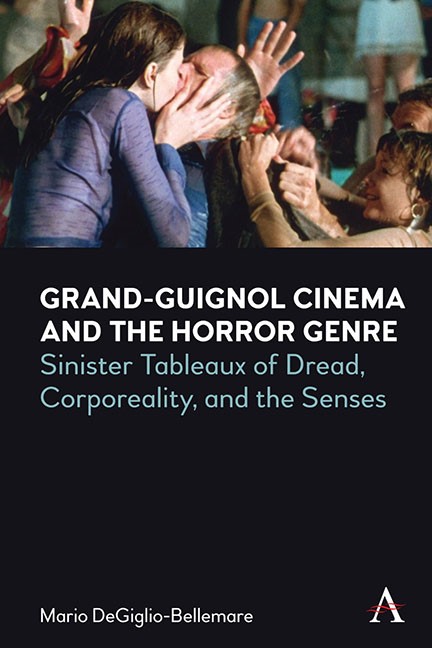Book contents
- Frontmatter
- Dedication
- Contents
- Miscellaneous Frontmatter
- Introduction: Grand-Guignol Cinema and the Senses: Eyes Without a Face, Attractions, Affect and Facial Trauma
- Chapter One The Grand-Guignol Theatre: A Short History of theTheatre and Spatial Ecologies of Dread The Hitch-Hiker and Shivers
- Chapter Two Grotesque Carnivals of “Stubborn” Aurality: Embodied Discourse in Early Talkie Horror Cinema Murders in the Rue Morgue, Freaks, and The Black Cat
- Chapter Three The Sight of Corpses in the Ruins of Modernity: Surgical Sadists under Censorship: The Body Snatcher, and Mad Love, The Blood of the Beasts
- Chapter Four Erotic Abattoirs of Bad Taste: Unproductive Potlatch in Exploitation Cinema: Fascination, Grapes of Death, and Salò, or 120 Days of Sodom
- Chapter Five French Colonial Skinning: Affect and Becoming-Wound in the Cinema of Sensation: Trouble Every Day, Sombre, and In My Skin
- Conclusion: Drag Performativity and Multisensorial Dread Blood and Black Lace and Psycho
- Bibliography
- Index
Chapter Five - French Colonial Skinning: Affect and Becoming-Wound in the Cinema of Sensation: Trouble Every Day, Sombre, and In My Skin
Published online by Cambridge University Press: 15 November 2023
- Frontmatter
- Dedication
- Contents
- Miscellaneous Frontmatter
- Introduction: Grand-Guignol Cinema and the Senses: Eyes Without a Face, Attractions, Affect and Facial Trauma
- Chapter One The Grand-Guignol Theatre: A Short History of theTheatre and Spatial Ecologies of Dread The Hitch-Hiker and Shivers
- Chapter Two Grotesque Carnivals of “Stubborn” Aurality: Embodied Discourse in Early Talkie Horror Cinema Murders in the Rue Morgue, Freaks, and The Black Cat
- Chapter Three The Sight of Corpses in the Ruins of Modernity: Surgical Sadists under Censorship: The Body Snatcher, and Mad Love, The Blood of the Beasts
- Chapter Four Erotic Abattoirs of Bad Taste: Unproductive Potlatch in Exploitation Cinema: Fascination, Grapes of Death, and Salò, or 120 Days of Sodom
- Chapter Five French Colonial Skinning: Affect and Becoming-Wound in the Cinema of Sensation: Trouble Every Day, Sombre, and In My Skin
- Conclusion: Drag Performativity and Multisensorial Dread Blood and Black Lace and Psycho
- Bibliography
- Index
Summary
In Chapter 5, I will continue my exploration of Grand-Guignol cinema through Claire Denis’ controversial modern tale of vampirism, entitled Trouble Every Day (2001), along with other key films from the French cinema of sensation. Like Jean Rollin’s Fascination, Denis’ film chooses not to present her blood-drinkers as supernatural entities. Yet unlike in Rollin’s film, the appetite for blood is associated, in Denis’s film, with the history of French colonialism. My examination of this film is particularly shaped by the important work of anticolonial theorist and revolutionary psychiatrist Frantz Fanon. While the narrative turns on a classic “return of the repressed” structure, I will examine Trouble Every Day in between psychoanalytical framework and affect studies as developed in the work of Gilles Deleuze and Félix Guattari. My use of the term “affect studies” rather than “affect theory” is in keeping with the heterogeneous weaving of elements incorporating anticolonial perspectives with phenomenology (Sobchack 2004), as well as with other studies on sensation and embodiment (Shaviro 1993; Marks 2000; Beugnet 2007). Aside from a few, preliminary studies, scholarship on affect in horror studies is only just beginning to make waves (Powell, 2005; Reyes, 2012 and 2016), and I believe it is a very important area of study for the genre going forward.
Following these scholarly currents, I am choosing in this chapter to pursue my exam-ination of affect in Grand-Guignol cinema through the sense of touch, or what Laura Marks has called “haptic visuality” (2000). The problematic designations of “French extremity” to the films studied in this chapter—and “torture porn” to American films such as Hostel (Eli Roth, 2006)—reflects a somatophobia that understands sensation as too excessive for analysis (Quandt, 2004; Edelstein, 2006). I am bringing these perspectives together as a political intervention that is concerned with epistemology, sensation and power. Reading Fanon alongside Vivian Sobchack, Steven Shaviro and Laura Marks is an important expansion towards making the corporeal, as well as the specificity of race and gender, central to film studies.
As early as 1935, Walter Benjamin began to think and write about media reception as tactile (2008). For Benjamin, “tactile quality” withered away the bourgeois experience of contemplation in the sensorial experiences of new reproductive medias (2008: 39).
- Type
- Chapter
- Information
- Grand-Guignol Cinema and the Horror GenreSinister Tableaux of Dread, Corporeality and the Senses, pp. 177 - 214Publisher: Anthem PressPrint publication year: 2023



